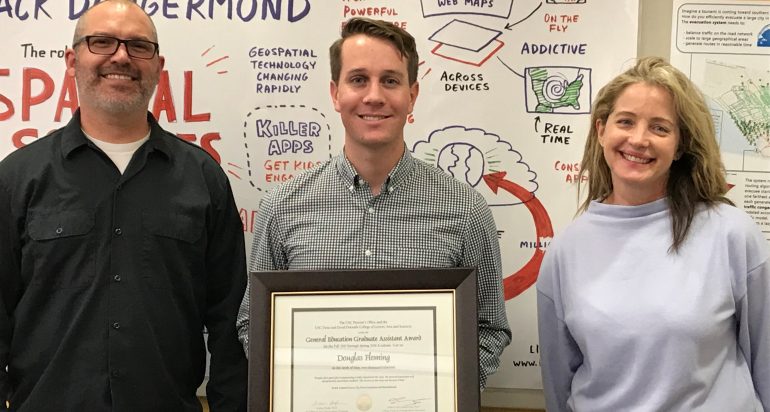On May 6, 2019, Dr. Richard Fliegel, Director of General Education and Associate Dean for Undergraduate Programs in the USC Dornsife College of Letters, Art and Sciences presented the 2019 General Education Graduate Assistant Award to Douglas Fleming, a doctoral candidate in the Spatial Sciences Institute Population, Health and Place Ph.D. Program.
At the ceremony held in the Scriptorium of the USC University Club, Fliegel indicated that this award recognizes the contributions that a graduate assistant in a general education course makes to the quality of the USC Dornsife undergraduate curriculum and the undergraduate general education experience in the just-concluding academic year.
The award recognized Fleming’s contribution in the Spatial Science Institute’s launch of SSCI 214: Human Populations and Natural Hazards, a new General Education course first offered in the 2017 – 2018 academic year, and his role in continuing with innovations in the course as a graduate assistant in the Fall 2018 and Spring 2019 semesters. Fleming worked with Dr. Darren M. Ruddell, associate professor (teaching) of spatial sciences, and Dr. Jennifer N. Swift, associate professor (teaching) of spatial sciences.
In congratulating Fleming, Swift noted, “Douglas has created effective ways to engage students in the course discussion sections and to inspire them to learn more outside of the classroom. One particular innovation is his use of online gaming techniques and having the student work in team to answer posted complex multiple-choice questions using Kahoot! Software. Douglas also provided us with invaluable assistance in lecture and exam preparation; created detailed lesson plans for the discussion sections he teaches; and supported students in unique ways both during and outside of office hours.”
Dr. Robert O. Vos, assistant professor (teaching) and USC Spatial’s director of graduate studies, also noted that the SSCI 214 course launched with 40 students and currently enrolls approximately 100 students per semester. “Douglas has provided us as faculty with ways in which we could immediately improve the students’ learning experiences while scaling up the class to a much larger size,” Vos added. “In my classroom observation, I was delighted to see how Douglas used the teaching technique of conceptual diagramming in which he posted a list of key concepts to date in the course, and then explained that it was each team’s task to draw a diagram that explained how the concepts fit together. Each team worked on this activity, and then students in each team came to the white boards to draw what they had come up with. The students were quite creative, and the conceptual diagrams ranged widely, including a house, a pizza, a solar system, a food pyramid, and traditional box and arrow flow chart,” said Vos.
In addition to this award, Fleming also is the recent recipient of the USC University Outstanding Teaching Assistant Award for 2018 – 2019 and the Irving and Jean Glovin Award from the Oskar Schindler Humanities Foundation for his research which promotes “good human conduct.”
Fleming said, “I thank Drs. Ruddell, Swift, and Vos for working with me as I improve my TA skills. I would not be getting these awards without the support and guidance I receive in the Spatial Sciences Institute.”
To learn more about the USC Spatial Sciences Institute academic programs in geohealth, visit spatial.usc.edu.





